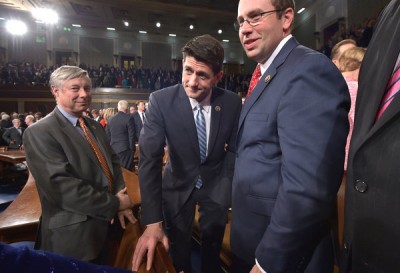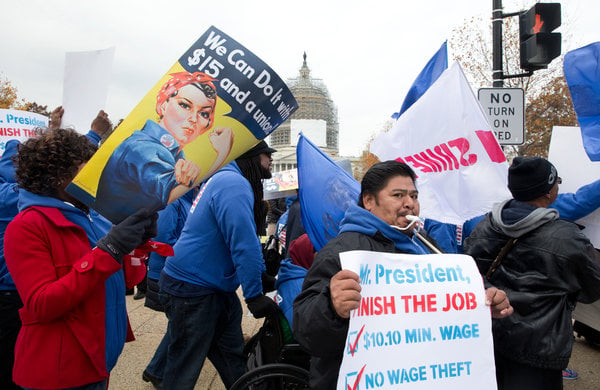‘Poor,’ ‘Middle Class’–What’s the Difference to the One Percent?

Rep. Paul Ryan (center) is the GOP’s “leading voice on poverty issues”–which makes him a natural, in the New York Times‘ eyes, to respond to a proposal to protect and strengthen the middle class. (photo: Mandel Ngan, published by NYT)
The New York Times(1/21/15) reports that “President Obama’s push for a new ‘middle-class economics’…will…help make the politics of rich and poor a central issue in the campaign to succeed him.”
Well, that’s puzzling, isn’t it? Why should an economics focused on the middle class make the two economic groups that are definitely not middle class–the rich and the poor–central political issues?
But the Times piece, by Jonathan Weisman and Ashley Parker, seems to treat the poor and middle class as almost interchangeable. Thus “Mitt Romney, vowing a campaign to ‘end the scourge of poverty’ if he runs for president a third time,” is presented as an example of the same phenomenon as “Mitch McConnell…encourag[ing] the Republican troops to refocus policy on the stagnant middle class.”
Yet these are very different political approaches, with different policy implications. The “middle-class tax cuts” Obama is said to favor wouldn’t do much for the poor, whereas the earned-income tax credit, whose expansion Rep. Paul Ryan (R-Wisc.) advocates, is designed to help the working poor rather than middle-income families.
Indeed, traditionally, the Republicans have accused Democrats of favoring the poor at the expense of the middle class (a charge that has led the Democrats for decades to declare their allegiance to the middle class).
Image, right: A demonstration in favor of increasing the minimum wage–something most Republican leaders don’t want to do. (photo: Stephen Crowley/NYT)
The Times, though, neither differentiates between the two approaches nor explains why they are really the same. Thus after Treasury Secretary Jack Lew advocates “pro-growth business tax reform that protects and strengthens the middle class,” the paper turns for a response to Ryan, “perhaps the Republican Party’s leading voice on poverty issues,” who “said accord could be reached on ways to reduce poverty.”
What’s to explain this poor/middle-class mash-up? The official poverty line for a family of four is $23,850. Median household income is $51,939. Perhaps from the point of view of the 1 percent, whose average household income is more than $1 million, it’s hard to see the difference?
And if the Republican Party’s goal, as the communications director for the Republican National Committee suggests, is “to do a better job of explaining their policies in an emotional way that shows voters they care about them,” then you don’t really need a coherent program to address the problems of the poor orthe middle class–you just need to be able to make a convincing sad-face when you talk about either one.
But even if the New York Times‘ chief owner is a billionaire, most of its readers are not. Those readers would benefit from journalism that takes social classes seriously as economic and political actors, rather than as undefined signifiers that political parties care about the little guy–whoever that may be.


